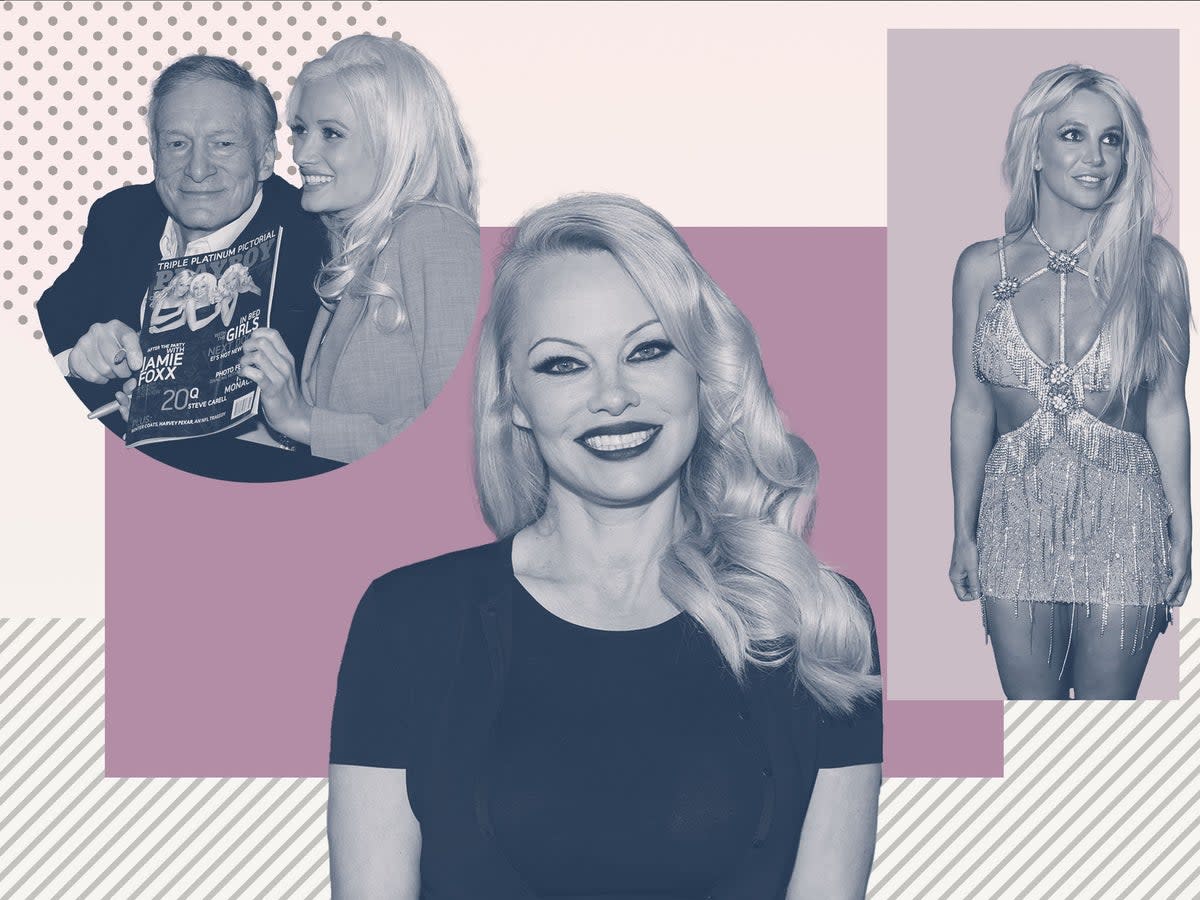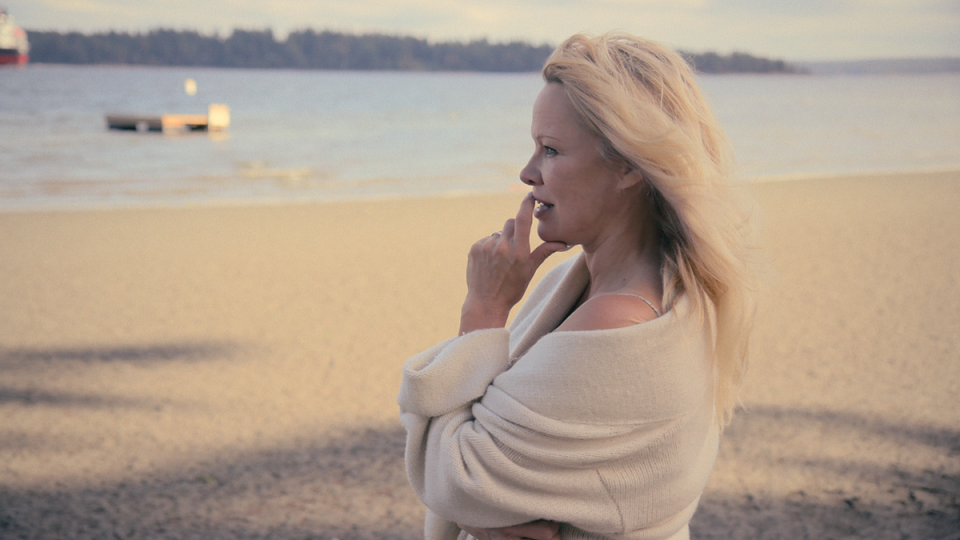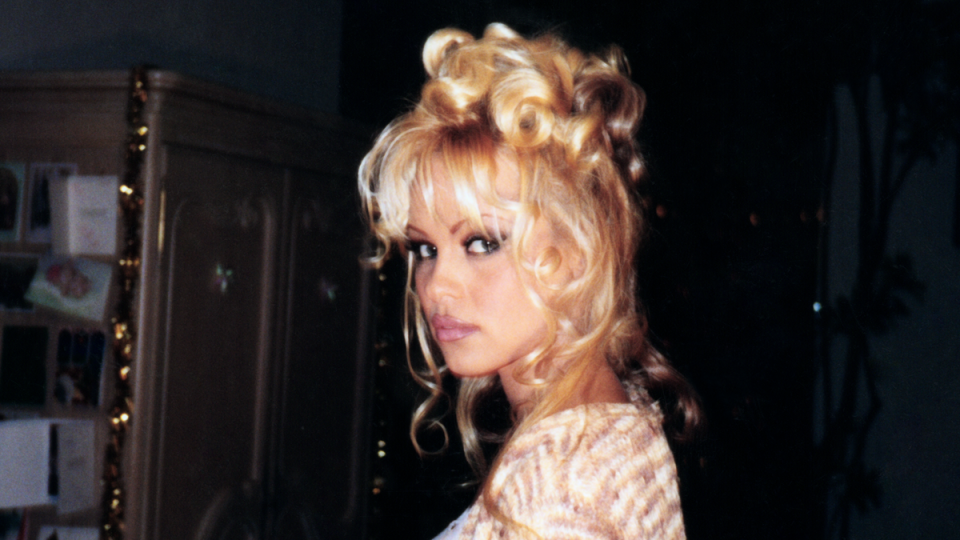A bombshell bites back: ‘Pamela, a Love Story’ aims to show Pamela Anderson ‘despite the nonsense’

The Pamela Anderson in Pamela, a Love Story, a new Netflix documentary, doesn’t wear make-up. She is consistently dressed in light tones, soft fabrics in whites and beiges. And yet, when the time comes to pack for a trip, she can’t pick between glittery pink platform boots and the zebra print platform boots. (“I’m taking both,” she tells the camera.)
Under the gaze of Ryan White’s camera, Anderson is witty, honest, and spontaneous. She laughs a lot, often at herself. She is not simply ready to open up about her personal life, she’s deeply committed to the exercise. Asked whether she’d be up to reading her old diaries in front of the camera, she says she’s not the best person for the job: “I might say, ‘No, I don’t want to read this, I don’t want to read that’.” The filmmakers should go through the volumes and ask someone else to read them aloud, she suggests. “You have my permission.”
Anderson’s candour is striking, especially as Pamela, a Love Story serves as a history of all the times its protagonist shared herself, or parts of herself, with the world, and was made to pay a price. Perhaps no other life better exemplifies the Faustian bargain entered by women made famous for their looks: you will be celebrated (in a flawed way), you will make money (usually less than people imagine), and in return, you will abandon any pretence of ever being taken seriously.
Pamela, a Love Story is the latest in a series of attempts to give beautiful women – or, more accurately, women known for being beautiful – back their due. Anderson’s story began in the pages of Playboy in 1990. Last year, another documentary pulled back the curtain on the Playboy mansion. Secrets of Playboy, which aired on A&E in February 2022, featured interviews with Holly Madison, formerly Playboy founder Hugh Hefner’s “main girlfriend”, and others from the Playboy world. Former Playmate Susie Krabacher, a participant, alleged Hefner had raped her. Madison said he kept a “mountain of revenge porn” that left her afraid to leave.
Both documentaries tell stories of pain, of fraught careers where the road to empowerment can also lead to exploitation. Both seek to humanise their subjects by making their suffering visible. Both, too, challenge a pre-established narrative cemented by pop culture: that of a pretty lady doing pretty things, living happily ever after. If the pin-up is a fairytale character, those two documentaries – especially Secrets of Playboy – trudge the dark forest behind the enchanted castle. The protagonists themselves serve as our guides. Anderson, Madison, Krabacher share their stories willingly, on camera. To speak alliteratively, the bombshells are biting back. They are speaking for themselves.
At the age of 22, Anderson approached her Playboy shoot with pure enthusiasm. The native Canadian saw it as the opportunity of a lifetime, circumvented work visa issues, and took to the Playboy mansion like a duck to water. There, she looked at other women’s bodies with awe. Upon being many had undergone plastic surgery, she decided to join the party. From there, it seemed understood – by casting directors, interviewers, and the world at large – that Anderson was fair game. You could ask her about her breasts. You could ask her about her implants. You could make her the punch line.
This escalated until the theft, in 1995, of a sex tape featuring Anderson and her then-husband Tommy Lee, of Mötley Crüe. In Pamela, a Love Story, Anderson recounts this period as one of the most distressing of her life. She and Lee had just started a family. They did not know how to get the tape back, nor how to handle the violation of their personal lives when it was published. Last year, the sex tape saga was dramatised in a miniseries, Pam & Tommy, starring Lily James as Anderson and Sebastian Stan as Lee. James told Net-a-Porter in February 2022 she “was really hopeful that [Anderson] would be involved,” and that she “[wished] it had been different.” She said she had tried to contact Anderson personally, and that she “was very hopeful that we would be in touch right up until we started filming”.
Anderson, who says in Pamela, a Love Story, that she has never watched the stolen tape, experienced the miniseries as the needless dredging up of an experience that had been, to her, deeply traumatic. “It really gives me nightmares,” she says.

Timing-wise, it’s tempting to see Pamela, a Love Story as a response to the miniseries, but the documentary is more ambitious than that. It’s a response to every slight along the way – to the men and women who thought of Anderson as perpetually unserious, to the pain of her marriage to Lee, who was sentenced to six months in jail in 1998 for spousal abuse, to the other husbands she tried to love afterwards. Anderson is 55 years old now. On screen, she comes off as acutely aware of her own narrative, unashamed of the parts so many have deemed embarrassing, yet hopeful for a different ending.
Professionally beautiful women can have a hard time getting heard. Before Secrets of Playboy, Holly Madison published a memoir; Down the Rabbit Hole: Curious Adventures and Cautionary Tales of a Former Playboy Bunny came out in 2015. In it, she began making clear that there was more to her story than its seeming glamour – it was not a fairy tale, but, as the subtitle made clear, a cautionary one. She writes of filming the Playmates-focused reality series The Girls Next Door: “I never thought of myself (or my two co-stars) as role models or anyone to be taken seriously.” Despite this sincerity, it took several more years for her narrative to unfold in full in Secrets of Playboy – perhaps aided by the revelatory nature of the documentary form.
Pamela, a Love Story might not have been made if we were not already reprocessing the Eighties and Nineties, and their unfairly tormented women. The podcast You’re Wrong About has devoted episodes to several of them – Tonya Harding, Vanessa Williams, Anna Nicole Smith. The successful legal battle (and fan-led campaign) to see Britney Spears relieved of her conservatorship forced us to consider the humanity of one of the decade’s most famous pop stars.
Spears, too, has been given the documentary treatment, many times over. There was the BBC’s The Battle for Britney: Fans, Cash and a Conservatorship, The New York Times’ Framing Britney Spears, Netflix’s Britney vs Spears, and CNN’s Toxic: Britney Spears’ Battle for Freedom. On her Instagram, Spears has at times been critical of the programmes, without always singling out a particular one; in a now-defunct Instagram post, she said she felt they brought back “humiliating moments from the past”.

Instead of a documentary or a book, Spears has so far preferred to share her personal story on her Instagram account. Her posts have consisted of frequent dancing videos, quotes (“I love being me, it pisses off all the right people,” reads a recent one), and miscellaneous clips and photos. Her captions are long and sometimes refer to specific incidents; they have prompted fans to go on hunts for clues and deeper meaning. It stands to reason that Spears could get a documentary deal, or a book deal, or both, with the business partners of her choice. TV hosts would be remiss not to trip over themselves to set up a tell-all interview, à la Harry and Meghan. But Spears, so far, has remained faithful to the platform that enables her to share directly and freely. Everything she has wanted to say publicly, she’s already said.
In June 2021, when she gave a public court statement about her conservatorship, Spears mentioned her desire to speak publicly. “I have the right to use my voice,” she said. She mentioned the possibility of doing an interview, before recanting: “Instead of having an interview, honestly, I need that to get it off my heart, the anger and all [that’s] been happening.”
For Anderson, a woman who once made an interviewer laugh openly by insisting she was a “serious actress”, the possibility of reinvention came most visibly in an invitation to play the part of Roxie Hart in the Broadway musical Chicago. This was real theatre: the legacy of Bob Fosse, an Oscar-winning film adaptation starring Renée Zellweger as Hart. “The fact that they gave me a shot to do it is really shocking for me,” Anderson told Vogue in March 2022, ahead of her eight-week run in the musical. “I always thought I got away with murder in a bikini. I never had to apply myself to anything and at this point in my life, this was something I really needed.”
Anderson also has a memoir, Love, Pamela, coming at the end of January. Unlike many celebrities, she did not work with a ghostwriter, but only, as she told People, “an editor to befriend and argue with”. The book and the documentary work as companion pieces to each other. Both feel like parts of the same excavation, of the life we so often witnessed Anderson living, without being able to access the parts of it that felt emotionally true to her. They bring to mind a mission statement of sorts, written by Anderson years ago in a journal and recounted in Pamela, a Love Story: “I try to find ways to be seen despite the nonsense.”
‘Pamela, a Love Story’ streams on Netflix on 31 January in the US and in the UK


